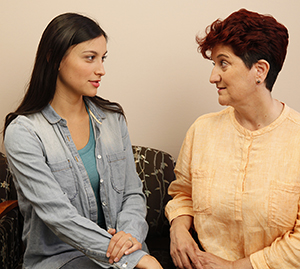Losing a child through miscarriage or stillbirth is a painful experience. Grief is a normal reaction to this loss. You may not want to believe the loss is real. You may feel numb, in shock, or angry. You may even think you could have somehow stopped the loss. At first, it may feel impossible to get through each day. But you will feel better with time, as you let yourself grieve.
Emotional and physical changes
Grief is complex. The grieving process varies from person to person. It can cause a lot of emotional and mental changes, such as:
-
Feeling sad, depressed, hopeless, or angry
-
Feeling worried, guilty, anxious, or afraid
-
Trouble with memory and thinking
-
Not wanting to talk with or be around other people
-
Loss of interest in things you used to enjoy
-
Loss of interest in your life and work
Grief can also cause physical changes, such as:
-
Loss of appetite or overeating
-
Weight loss or gain
-
Tiredness
-
Trouble getting to sleep or staying asleep
-
Headaches, upset stomach, or hair loss
-
Sense of trouble breathing
-
Trembling or shakiness
Caring for yourself
While you are grieving, you need to take care of yourself. During this time:
-
Take care of your body. Eat a healthy diet and get physical activity. Get as much sleep as you can.
-
Don't use alcohol or drugs to numb your feelings. This can slow the grieving process and be harmful to your health.
-
Don't spend a lot of time alone. Have daily contact with family or friends. Talk about your loss with those closest to you.
-
Take time for yourself. Make a point to do things that you enjoy.
-
If you have been prescribed a medicine to help with your symptoms, take it only as directed. Don't use it with alcohol.
-
Try to avoid making major decisions.
Accepting support
You will need support while you are grieving. That support can come from family, friends, and neighbors. Your healthcare provider may refer you to a therapist or grief counselor. A grief support group can help. And this is the time many people reach out to their spiritual or religious community. During this process:
-
Stay in touch with family and friends, even if it’s hard to talk.
-
Stick to a daily routine that keeps you connected to friends and family.
-
Tell people how they can help. It can be as simple as bringing you a meal or walking your dog.
-
Meet with your faith leader, a counselor or therapist, or your own healthcare provider.
Consider joining a grief support group. Ask your healthcare provider how to find one in your area. Support groups can help you cope with your feelings and talk with others who have had a similar experience. These people can share what has helped them through their toughest moments. A support group can also help you with follow-up care. Grief can come back years later. It may be triggered by a memory or another pregnancy. Follow-up care can help you manage long-lasting effects of grief over months or years.
For other types of support, search online for “pregnancy loss support” to find resources like these:
-
Share: Pregnancy & Infant Loss Support at https://nationalshare.org/
-
March of Dimes at https://www.marchofdimes.org/find-support/topics/miscarriage-loss-grief/dealing-grief-after-death-your-baby
-
The Pregnancy Loss Support Program at https://www.pregnancyloss.org/
Saying goodbye
You may wish to have a memorial or funeral service for your child. This can also help family and friends understand the loss better. It can help give you and your family time to grieve together. Talk with the hospital staff if you wish to make funeral arrangements.
When to call the healthcare provider
There's no normal length of time to grieve. But if you feel unable to function, you may need extra help. Seeking help is not a sign of weakness. It means that you are taking charge of your recovery. Call your healthcare provider if you:
-
Can’t eat or sleep for several days in a row
-
Have thoughts of harming yourself or others
-
Can’t work or take care of yourself or others as needed
-
Feel out of control with extreme sadness, fear, or anger
-
Family or friends have asked you to get help
-
Gain or lose a lot of weight
-
Feel your grief is getting worse, or not getting any better
Important
If you have thoughts of suicide or of harming yourself or others, call or text
Moving forward
At some point, you’ll begin thinking about the future. You’ll look ahead and make plans. To help yourself reach this point, try to do one thing each day to join in life. Keep at it, even if it feels strange at first. Your life may never be exactly the same. But one day you’ll find you’re living life fully again.


